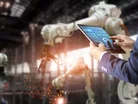Manufacturers, this is how you become future-proof

As many companies’ business models depend on globally integrated supply chains, the changing geo-political-economic landscape and significant fluctuations in consumer demand will mean manufacturers will need to be even more flexible and agile than ever before. As a result, the development of new manufacturing ecosystems, with the right set of technologies, people and culture to bring them to life has become increasingly important during 2019, a crucial part of which will be human experience in order to design, develop and implement effective change strategies.
Prasad Satyavolu, Chief Digital Officer, Manufacturing & Logistics at Cognizant, outlines three key areas for manufacturers for 2019.
The scaling-up challenge
To create an ecosystem that will stand the test of time, scaling up in manufacturing is - and will continue to be - a critical area that involves several technological aspects. According to a survey by PwC, 72% of manufacturing companies are dramatically increasing the speed of their digital transformation and expect to be able to be ranked as ‘digitally advanced’ by 2020, compared with just 33% in 2018. These companies are committing almost US$907bn per year, about 5% of revenues, toward greater connectivity and smarter factories.
In line with this, there should be large-scale adoption of ‘maturing’ technologies, like 3D printing, blockchain and drones. The latter, for example, will be increasingly used not only for distribution but also to automate internal processes, for example, carrying materials inside facilities in a matter of minutes, increasing productivity.
Unfortunately, many businesses are now failing to take advantage of innovation, mainly because of a lack of a business model that allows a seamless implementation across multiple locations. Companies would be wise to review their current investment in automating processes to establish if they are working as efficiently as they could be with the aim of increasing productivity.
Focus on human experience
The second focus area for manufacturers in 2019 will be improving the human experience, not only customer experience (CX) but also employee & partner experience. Companies will, therefore, need to invest heavily in people development and training in 2019.
SEE ALSO:
- To maximise automation, manufacturers must integrate business apps
- The UK steel, pharmaceutical and transport manufacturing industry are receiving a £30mn investment
- The journey to utilising 3D printing across the manufacturing space
- Read the latest issue of Manufacturing Global here
All industries increasingly realise that it is important to create a strategy and culture that supports digital transformation that incorporates skill and career development.
As for experience, we expect to see many large-scale initiatives with a focus on integrating Industrial Internet of Things (IIoT) programmes and increased application of Artificial Intelligence and Machine Learning to create intelligent processes and improve products and services. Closed loop systems will start to emerge as the norm for creative experience design effectively merging AI and analytics with voice, video and hepatic front ends besides device screens.
Invest in a sustainable future
Last but not least, every company needs to beware of climate change. Companies are struggling with the need to decrease emissions through lower energy consumption. For example, the European Commission has set ambitious targets to lower carbon emissions in the region, as much as 40% less by 2030.
Many manufacturers may start using IIoT systems more broadly to measure and optimise energy consumption across their operations in the region. Climate change and investments in energy efficiencies will take centre stage in 2019 and beyond. According to a global survey by Bain & Company, the share of companies that have adopted a truly transformative sustainability aspiration will nearly triple over the next five years, from 9% to 26%.
Increasing awareness of climate change issues will lead to a boost in the production of products and services that are sustainable, such as investments in electric vehicles and alternative fuels.
“For competitive advantage, manufacturers should invest in maturing technologies at scale to increase productivity, improve the human experience and make a positive contribution to climate change”, Satyavolu explains. “Therefore, we will see manufacturers investing in new business models that enable them to innovate, transform and respond to change quickly. Only when the high demands of consumers are met in an experience-focused economy will manufacturers be able to realise growth and stay relevant in 2019 and beyond.”
- Schneider Electric's Strategic Human-focused DigitalisationDigital Factory
- Merck & Siemens Partner on Digital Transformation TechnologySmart Manufacturing
- Digital Transformation: How to Win the Persuasion GameDigital Factory
- Manufacturing Buyers Driven Away by B2B Webstore HeadachesTechnology

